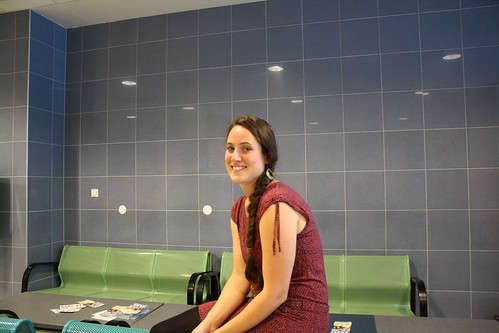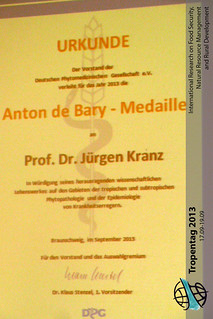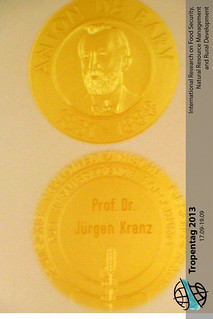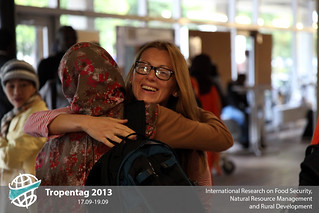Tropentag
Science networking: a necessary challenge.
Tue, 09/18/2018 - 19:24 — degodoyIt is not simple, as demonstrated in the third oral presentation session today. But the co-production and sharing of knowledge is an important approach to create awareness, improve social-economic conditions and find appropriate technologies in different places. The challenges and barriers are numerous, as Ms. Kristina Roesel from the International Livestock Research Institute in Kenya and Dr. Tom Bischof from the Zurich University of Applied Sciences emphasized on their presentations: long distances, difficulty of communication, poorness of infra-structures and cultural differences. All of these make the co-working of partnership of universities a complex task. But the benefits are undeniable, and successful cases like the e-learning platform offered by the Zurich University of Applied Sciences to the University of Lubjlana in Slovenia and the University of Agricultural Sciences in India, the RELOAD project from The University of Nairobi in partnership with University of Kassel (presented by Ms. Catherine Kunyianga) and the Mytox South, created at the University of Ghent between multiple universities in sub-Saharan Africa to reduce the risk of mycotoxins contamination in food (explained by Dr. Arnau Vidal from the University of Ghent). These programs show how it is possible to offer effective solutions to complex interdisciplinary problems. Ms. Camilla Adelle, from the University of Pretoria further unraveled the issues involved on trans-disciplinary research and production of knowledge, and the role of scientists on this mutual relation.
Nourishment by Insects!?
Tue, 09/18/2018 - 14:48 — degodoyYes, this idea is slowly being more accepted by western societies and becoming accessible to the increasingly growing population worldwide, as we could see in some of the presentations today! Traditionally used in Asian, Latin American and African cuisines, this practice has the potential to play an important role for nutrition security, helping to attend food demand and combat hunger. Due to the limited amount of agricultural land and natural resources, there is an urgent need to find other alternatives for protein sources than conventional meat products. In some places (e.g. Kenya and Uganda), it already constitutes 5–10% of protein intake of the rural and urban populace. Also, livestock production is a leading cause of anthropogenic-induced climate change; therefore more sustainable diets are needed.
Gabriel, the explorer
Sun, 09/16/2018 - 14:02 — degodoyGabriel is an Agricultural Engineer from Brazil that just arrived in Belgium to start a MSc. Program in Nutrition and Rural Development at the University of Ghent. In the past years, he had some experiences with Sustainable Agriculture that significantly changed his way of understanding food production and the use of natural resources. He is looking forward to enjoy this opportunity of studying in Europe and learn about cultural and technical aspects of food production and consumption in a different continent. He is really excited to work as a Student Reporter at Tropentag as he believes this event covers a lot of the needs for enhancing agricultural production around the world, and it will be a great start for his young career abroad.
Behind the scenes with Sarah – you cannot plan everything
Wed, 09/17/2014 - 10:35 — Nissen Learning by doing – you cannot plan everything. Sarah knows that the only way to handle the unexpected is to be flexible. Rooms are locked, material is in the wrong place – lots of problems have to be solved behind the scenes to keep the Conference working. But the stressful moments last only for a few hours and there are, of course, many positive experiences. Last year the students surprised her with flowers for her support. Next year Sarah is going to do her pHD research in Brazil about integrated crop- livestock system – let’s hope she has next year nevertheless the time to help the students.
Learning by doing – you cannot plan everything. Sarah knows that the only way to handle the unexpected is to be flexible. Rooms are locked, material is in the wrong place – lots of problems have to be solved behind the scenes to keep the Conference working. But the stressful moments last only for a few hours and there are, of course, many positive experiences. Last year the students surprised her with flowers for her support. Next year Sarah is going to do her pHD research in Brazil about integrated crop- livestock system – let’s hope she has next year nevertheless the time to help the students.
The 2013 Anton de Bary Medal Prize Laureate: Prof. Dr. Jürgen Kranz
Sat, 09/21/2013 - 14:22 — Pamella Ogada
 The 2013 Anton de Bary Medal
("http://dpg.phytomedizin.org/de/die-dpg/auszeichnungen-preise/")
The 2013 Anton de Bary Medal
("http://dpg.phytomedizin.org/de/die-dpg/auszeichnungen-preise/")
Brigitte Maass, forage expert of CIAT encourages young scientist to participate in the Tropentag
Fri, 09/20/2013 - 12:16 — Minette Flora M... maintaining relationships
maintaining relationships
We part to meet again: Tropentag 2012 makes way for Tropentag 2013.
Thu, 10/04/2012 - 13:43 — De-Registered UserResilience Addressing the Social Aspect of Rural Development
Fri, 09/21/2012 - 12:18 — De-Registered User With content smiles on their faces, students and professors alike got down to the artistic business. Within only one hour the participants each produced a painting and a poem dealing with the topics that concerned them the most during the last few days.
Various subjects came to the minds of the participants from different disciplines and nations.
With content smiles on their faces, students and professors alike got down to the artistic business. Within only one hour the participants each produced a painting and a poem dealing with the topics that concerned them the most during the last few days.
Various subjects came to the minds of the participants from different disciplines and nations.






